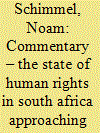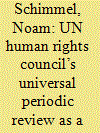|
|
|
Sort Order |
|
|
|
Items / Page
|
|
|
|
|
|
|
| Srl | Item |
| 1 |
ID:
193270


|
|
|
|
|
| Summary/Abstract |
As South Africa approaches 30 years of democracy, it is important to pause to reflect and analyze the trajectory of human rights since the fall of the apartheid regime and the advent of multiracial democracy. Although there was a large global movement against apartheid, this movement's vigilance for human rights in South Africa quickly declined and dissolved with the advent of South African democracy. There is little critical engagement with South Africa's contemporary human rights record and policies by global human rights activists, nongovernmental organizations, and civil society and still less active campaigning in defense of the human rights of South Africans, especially South Africa's most vulnerable and disadvantaged black majority. The energy that was summoned to protest apartheid and to boycott it never returned since the advent of democracy. This commentary explores the current state of human rights in South Africa, their prospects, and challenges to their respect, protection, and fulfillment.
|
|
|
|
|
|
|
|
|
|
|
|
|
|
|
|
| 2 |
ID:
186874


|
|
|
|
|
| Summary/Abstract |
This article examines the legal contours of the international law regime as it relates to internally displaced people (IDPs) and assesses it critically. It analyzes the structural legal and humanitarian injustices from which IDPs suffer as a result of often arbitrary distinctions between them and refugees in international refugee law, international human rights law, and international humanitarian law. It explores how IDPs do not have the same explicit, dedicated legal protections in international law as refugees who have fled their countries of origin and crossed an international border. It argues that precisely because IDPs lack international legal protections, their rights and needs are often overlooked and met with indifference and lack of sufficient humanitarian response from the United Nations, its agencies and member states, and global humanitarian NGOs. It discusses efforts to recognize a specific set of international legal rights for IDPs, why they have been stymied for several decades, and the practical consequences in terms of human rights deferred and denied and human welfare undermined for IDPs and their increasing vulnerability and disadvantage. Finally, it presents ways of improving respect for and fulfillment of the human rights of IDPs.
|
|
|
|
|
|
|
|
|
|
|
|
|
|
|
|
| 3 |
ID:
193254


|
|
|
|
|
| Summary/Abstract |
Applying the case study of Saudi Arabia, this article examines the rhetoric of nations who are well documented as being severe violators of human rights and the use they make of the UN Human Rights Council Universal Periodic Review (UPR) mechanism to defend, downplay, and deny their human rights violations. Authoritarian countries who violate human rights systemically, severely, and intentionally as a matter of government policy apply different rhetorical strategies when undergoing the UPR process and writing and submitting their respective national reports for the UPR process. This article analyzes these strategies, illustrates how different countries use them during the UPR process, and explores the value and limitations of the UPR process and its efficacy at advancing human rights.
|
|
|
|
|
|
|
|
|
|
|
|
|
|
|
|
|
|
|
|
|